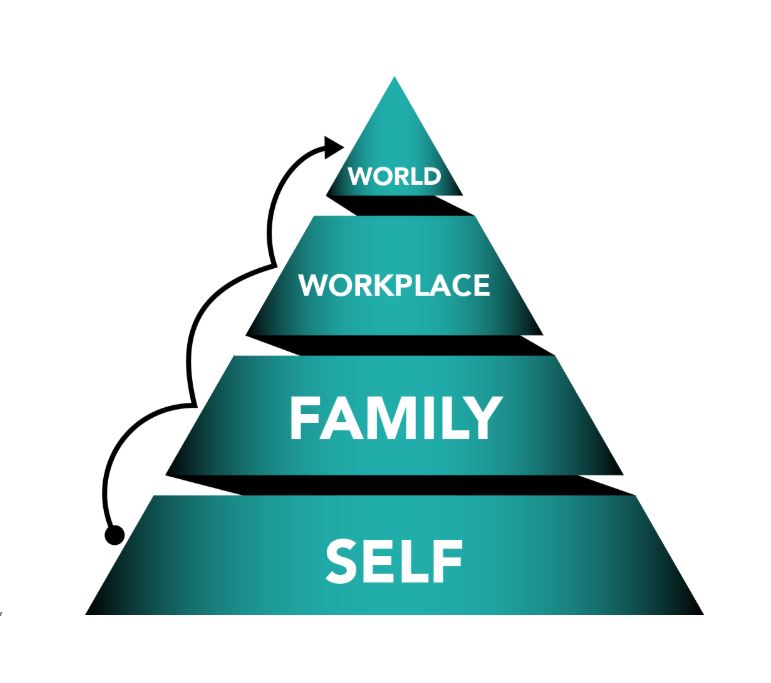“It’s not lack of love, but lack of friendship that makes unhappy marriages.”—Nietzsche
Today’s BIG IDEA—No one arrives at a great marriage by accident.
A few years ago, my wife and I decided to join a one-year marriage enrichment program through our church. We recently had our first child and we were experiencing more exhaustion and conflict than before we had children, so we wanted to pick up some strategies to keep our relationship strong.
It was also a wonderful way to glean wisdom from other couples who had navigated raising multiple children, blended families, and decades of marriage through the trials of life.
Many couples shared about how easy it was for the kids to become the center of the relationship. Some couples even shared they had not had a date with their spouse for over ten years.
One thing was clear from every couple—Making marriage work is hard work, but well worth the effort.
For those who are married, a comprehensive leadership plan should include a thoughtful strategy for a strong and lasting marriage.
Consider the impact of your marriage on all the other areas of your life. Research shows that a marriage (good or bad) will have a very large effect on your physical and mental health, how long you live, your children’s emotional stability, and your financial well-being. This is not an area you want to be on autopilot.
Even if your marriage is in a difficult place right now, you can dramatically reduce regret by giving it your very best effort and time. And importantly, if you don’t learn what changes you might need to make in yourself, it’s likely you may take those same problems into the next relationship.
Rates and causes of divorce
According to the American Psychological Association (APA), about 45% of all US marriages end in divorce. The rate is higher for subsequent marriages.
Psychologist Dr. John Gottman is one of the world’s foremost experts in marriage. He has studied marital stability and divorce prediction for the last 40 years. During his time at the University of Washington “Love Lab,” he recorded countless couples interacting and dealing with conflict. Several of his studies have affirmed that he has been able to predict whether a couple will divorce with about 90% accuracy.
In his research and his books, he explains the root causes of divorce.
One of Gottman’s key insights—“Marriages become stable over time if couples learn to reconcile successfully after a fight.”
He argues that there are 4 big reasons that prevent successful resolution of conflict. He calls them the “4 Horseman of the Marriage Apocalypse”—Criticism, Defensiveness, Contempt, and Stonewalling.
- Criticism—No one wants to be around someone who is constantly criticizing them. It’s especially bad when one partner attacks the other person’s character, or uses words like you always or you never.
- Contempt is an extreme form of criticism and the single greatest predictor of divorce. Contempt is mocking sarcasm and serious lack of respect or empathy. It even harms your health. It has been said that what we focus on expands. If we focus on the things we dislike about our partner, they will grow.
- Defensiveness means that you react quickly to protect yourself, and may shift blame or avoid responsibility for your actions. This leads to what Gottman called harsh start-ups, or arguments that escalate very quickly. Partners must be able to vent important feelings without an immediate explosion.
- Stonewalling is the final phase and is usually a reaction to criticism or contempt. When one partner feels emotionally overwhelmed, it’s not uncommon for them to check out of the relationship and refuse to talk. One party will disengage from the communication process by creating physical and emotional distance, often through becoming extremely busy with activities outside the home, like work or hobbies. This behavior can quickly become a habit, and these marriages have a very difficult time getting back on track.
If you recognize any of these things in your current marriage, the earlier you can intervene and turn things around, the better.
It is important to recognize that the absence of conflict in marriage is not the goal. In fact, it is often a sign of false harmony, and an indicator that important feelings are not being addressed.
What can you do to strengthen your marriage?
The following is adapted from Gottman’s research:
- Never stop getting to know each other. Gottman calls this building your love maps. We cannot love someone we don’t know. The most stable couples have a strong friendship as their foundation. The idea is to continue being curious about your spouse—knowing their favorite things, their greatest hopes or deepest fears, and current stressors. Gottman has a great quiz called How well do you know your spouse? Link at bottom.
- Invest heavily in the positive experiences and focus on the good stuff. This is critically important. Gottman calls this building fondness and admiration. Play together, schedule regular dates. Just like a gratitude practice, keep focusing on the good things about your partner. This helps to build a reservoir of positive emotions and memories that can buffer against the hard seasons. All relationships wither without investments, so make it your goal to invest heavily in positive interactions. In fact, Gottman and his co-author Nan Silver recommend that you should aim for at least five positive experiences for every negative one (smiling, touching, laughing, complimenting).
- Habitually turn toward each other. This involves two things—First, make a regular practice of spending even 15-minutes together talking about your day. Time is not the only ingredient for a successful relationship, but it is essential. Gottman recommends you build up emotional currency by not taking your small daily interactions for granted. Second, when conflict comes up, keep turning toward each other instead of running away.
- Let your partner influence you. Gottman found that the happiest and most stable couples were those that worked as a team. No one wants to be in a “my way or the highway” relationship. The strongest couples listen to each other’s opinions for decision making, and seek common ground. They also have different roles and know what each partner does well.
- Develop a habit and process for addressing conflict. Gottman calls this solving your solvable problems. Start by being soft and clearly expressing your needs. Make continued attempts to repair the problem and de-escalate the conversation. Practice soothing yourself and calming yourself down. Be tolerant of each other’s flaws.
- Clearly identify the big problems. Some issues in marriage are really big ongoing sources of conflict. Make sure you identify those and watch for what Gottman calls gridlock. These can be a source of perpetual irritation. One great strategy is to get to know your own dreams, and your spouses dreams so that you can determine where they may be incompatible. If one person feels they must sacrifice their identify for the relationship, resentment can set in. The goal is to support each other’s aspirations without sacrificing your own completely. Be creative and learn to discuss these things without hurting each other. You may need to discuss them continuously.
- Develop a shared purpose. According to Gottman, when couples agree on the big purposes for life and marriage, conflict is much less likely to lead to gridlock. It can help to have a family mission statement and discuss the big-picture about what brings meaning and purpose to life. He also says that every family has its own mini-culture, which answers the unique question—What does it mean to be part of this family?
Have a great weekend!
Parker
Suggested Resources
- John Gottman’s quiz on how well you know your partner—https://www.gottman.com/how-well-do-you-know-your-partner/
- American Psychological Association on Divorce https://www.apa.org/topics/divorce/
- The Seven Principles for Making Marriage Work—John Gottman & Nan Silver




